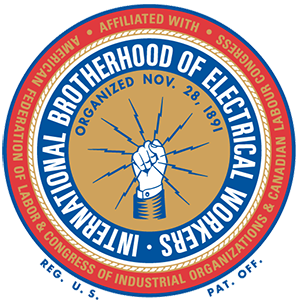Workers Are The IBEW

The IBEW is a group of over 750,000 workers who have committed to the principles of family, fairness, justice, equality and solidarity. We are an organization that has fought to improve the lives of working families by joining together in strength and solidarity to fight for the rights of working families including the 40 hour work week, overtime pay, minimum wages, family and child medical leave, workplace safety, equal pay for women and minorities, plus job protection against favoritism.
One of our greatest attributes is our ability to stop the company from making changes to your working conditions. We negotiate and fight for a contract to protect your rights. Employees deserve to know what their working conditions, wages and benefits are. It is not right, when a corporation unilaterally takes those away from you. The IBEW is here to help!
Why IBEW?
The IBEW stands for quality workmanship and dedication. The professionals of the IBEW take pride in their work and are committed to setting new standards of excellence. Our skilled members work in nearly every part of the economy: utility, construction, telecommunications, broadcasting, manufacturing, railroad, and government. Formed in 1891 we have earned our reputation as one of the oldest, largest and most professional labor organizations in the world.
Our foundation is solid. The IBEW has worked to build an empowered workforce and partnered with employers to face the challenges of an evolving economy and developing technologies. Our priority is safety. Safety is a founding pillar of the IBEW. We vigorously advocate for effective and safe work standards and work closely with businesses, regulatory agencies, and labor organizations to reduce accidents both on and off the job.
IBEW members can be confident that as their industry continues to evolve, the Brotherhood will be there to help them face the challenges of the future.
Our trained, experienced staff of field representatives are skilled negotiators who know the utility industry. We devote full-time effort to aiding local unions and members with contracts and grievances.
National Labor Relations Act
Congress enacted the National Labor Relations Act ("NLRA") in 1935 to protect the rights of employees and employers, to encourage collective bargaining, and to curtail certain private sector labor and management practices, which can harm the general welfare of workers, businesses and the U.S. economy.
(11) The term "supervisor" means any individual having authority, in the interest of the employer, to hire, transfer, suspend, lay off, recall, promote, discharge, assign, reward, or discipline other employees, or responsibly to direct them, or to adjust their grievances, or effectively to recommend such action, if in connection with the foregoing the exercise of such authority is not of a merely routine or clerical nature, but requires the use of independent judgment.